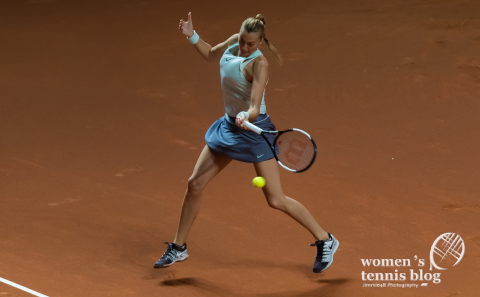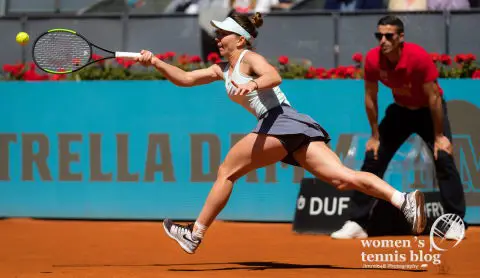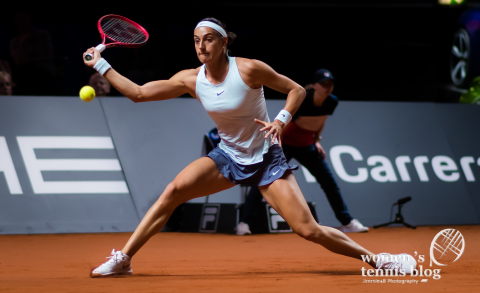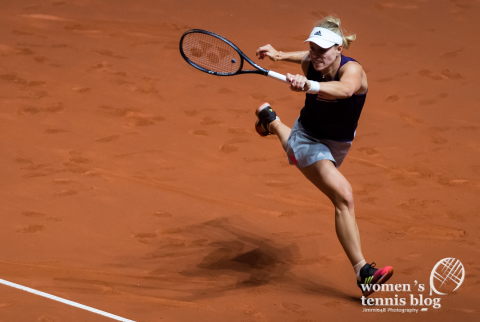In this month’s column, coach Marcin Bieniek, founder of instructional Enjoy Tennis Blog, explains the importance of good footwork and how proper movement connects many other tennis skills. To put advice into practice, Marcin is giving us three concrete moves that we can work on to gain advantage over our opponents: split step, sprint and deceleration, and crossover step.
Technical skills in tennis have to be accompanied by specific tennis movement. Petra Kvitova wins a lot of points using offensive forehand, Serena Williams is famous for hitting winners with her powerful backhand — every player has their own strengths that they use to dominate opponents, but movement is an important aspect of it.

Practice sessions are focused mostly on strokes. Player spend a lot of time sharpening forehand and backhand skills. Aware of the fact that serve and return start every point, players also take care of these areas by hitting hundreds of balls every day. It is true that technical and tactical skills are necessary to improve your level and get better chances to win the match, but players can’t forget specific movement techniques. Adding work related to movement will guarantee appropriate connection between preparation and execution of effective tennis strokes. This process has to be complete if players want to show their best ability every time they step on the court.
Some players are natural movers, while others look like they have legs made of wood. In both cases, it is crucial to learn how to effectively move from point A to point B in the fastest possible way and using the least amount of energy. A tennis match can last for several hours, so being fluent with movement helps you save energy for the final part of the match and use it to your advantage. Players who possess knowledge and skills about specific tennis movement get to more balls, have more time for stroke preparation and get less tired even while battling with really advanced opponents. These benefits show how important it is to spend some time during practice sessions on areas related to footwork.

Different surfaces require different footwork patterns, but there are some general rules that should be applied on every court:
Split step
This little jump is learned from the first tennis lesson, but even after many years a lot of players still don’t have it at world-class level. Split step should keep players active and ready to quickly react to the opponent’s shot, but to make it happen, a few points have to be addressed.
Firstly, a player has to time jump with the opponent’s shot. When the opponent hits the ball, the player should be at the peak of the jump to be able to read the ball and immediately move to one side right after the landing. Secondly, the player has to land on front part of the feet to guarantee the fastest possible reaction. Landing on whole feet or touching the ground with heels immediately erases the opportunity for quick movement. The last thing is consistency. Split step has to be made every time the opponent hits. There is no time for pause. Either you do it consistently or you don’t have a habit of this specific tennis movement.

Sprint and deceleration
Tennis is faster and faster year by year. Players have to adapt to these changes from different perspectives. They adjust their technique, implement new tactics, but they also have to take care of the movement aspect. Because of the game’s speed, specific footwork has to be applied to practice sessions and tournament performance. Players have to be able to cover the distance as fast as possible while sprinting, but it is not the only skill that is necessary to dominate opponents. To set up a good position, a player has to decelerate after a fast run, so this last part of the run has to be practiced too. Being too far from the ball or too close to the ball will always result in a lower-quality shot, so learning how to properly move and stop to set up a good position is crucial to achieving desirable performance under pressure.
Crossover step
One of the most used steps in tennis is crossover step. It is used to start the run or to recover after the shot. It is so popular because it allows to cover the ground much faster than shuffle step and at the same time it requires less effort from players. By practicing this step, players create a habit of using crossover step in different situations. It gives them advantage while preparing them for the shot and also while they take a proper position after the hit. Milliseconds can decide the result of a single point, so players have to make sure that they use available time between shots in the most effective way.

Tennis is a complex game. There is no one skill that we can say is the most important. To become a great player, we have to improve many different areas from technical racquet moves to the nutritional input before and after the practice. Proper footwork is one of the skills that connects many other skills and allows players to show their best side. It is possible to train it both on and off the court, so the only thing that stops you from improving this area is lack of willingness. Don’t let this little aspect lower the quality of your game, because in the game of tennis you have to move!
MORE ARTICLES BY TENNIS COACH MARCIN BIENIEK:
- Transferring tennis practice performance to the tournament environment
- Hardcourt tennis tips, four skills you must work on
- Self-rate your practice session
- Recovery and healthcare techniques to improve your tennis
- How nutrition affects our mental readiness in tennis
- Does one need private tennis lessons?
- How to maximize quality of tennis training sessions
- Post-practice routine for best tennis results
- How to play tennis in the summer heat without getting exhausted
- The reasons you absolutely have to play tennis on all surfaces
- 3 simple products parents miss to buy to help their kids excel in tennis
- How to improve reaction skills in offensive, fast-paced tennis
- How to control anger and frustration to win a tennis match
- Tennis tips: 3 areas that cost you too many points
- How to practice serve the right way
- Coaching tips: How to avoid mistakes in tennis
- Things to (not) do on vacation to improve your tennis game
- How to translate your tennis practice into match wins
- How to build team spirit in tennis
- How to become a master of claycourt tennis
- How to make your serve more effective
- How to choose the best tennis racquet to fit your level, playing style and body type
- How to handle playing tennis in sunny conditions and even take it to your advantage
- 5 portable fitness tools for serious tennis players
- Best foam roller exercises for tennis players




